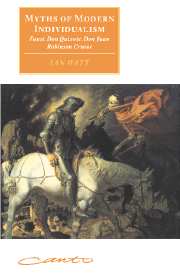Book contents
- Frontmatter
- Contents
- Preface
- Introduction
- Part I THREE RENAISSANCE MYTHS
- Part II FROM PURITAN ETHIC TO ROMANTIC APOTHEOSIS
- 6 Robinson Crusoe
- 7 Crusoe, Ideology, and Theory
- 8 Romantic Apotheosis of Renaissance Myths
- 9 Myth and Individualism
- Part III CODA: THOUGHTS ON THE TWENTIETH CENTURY
- Appendix The worldwide diffusion of the myths
- Index
8 - Romantic Apotheosis of Renaissance Myths
Published online by Cambridge University Press: 24 November 2009
- Frontmatter
- Contents
- Preface
- Introduction
- Part I THREE RENAISSANCE MYTHS
- Part II FROM PURITAN ETHIC TO ROMANTIC APOTHEOSIS
- 6 Robinson Crusoe
- 7 Crusoe, Ideology, and Theory
- 8 Romantic Apotheosis of Renaissance Myths
- 9 Myth and Individualism
- Part III CODA: THOUGHTS ON THE TWENTIETH CENTURY
- Appendix The worldwide diffusion of the myths
- Index
Summary
GOETHE'S FAUST
Herder persuaded intellectuals that myth was a creative product of the Volk, an authentic expression of the latent imaginative powers of humanity. It was, therefore, a symbolic moment when, in 1770, Goethe, who was then beginning to study law at Strassburg, met Herder. Incredibly, but appropriately, the meeting took place at an inn called Zum Geist, which may be colloquially translated as “At the spirit's place.” Herder became an inspiration to Goethe, who was only twenty-one (an age lacking the authority of Herder's twenty-six) but was already reacting against the Gallic rationalism of the University of Leipzig, where he had studied earlier. Herder, it has been said, “taught Goethe to be himself.”
It was perhaps in that very year, 1770, that Goethe decided to write his version of the Faust story. He already had projects for plays on other historical and mythological topics – Prometheus, Mohammed, Julius Caesar, and The Wandering Jew were considered – but the 1587 Faustbuch, and its vast progeny of popular versions and puppet plays, had the double advantage both of being German and of belonging to the folk tradition. Goethe did not then know Marlowe's version of the story, which he seems to have read only in Wilhelm Muller's translation of 1818; but Marlowe's play had already contributed to German perceptions of Faust, through the performances of English strolling actors as early as 1608.
- Type
- Chapter
- Information
- Myths of Modern IndividualismFaust, Don Quixote, Don Juan, Robinson Crusoe, pp. 193 - 227Publisher: Cambridge University PressPrint publication year: 1996



